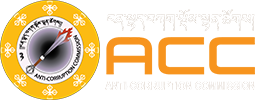A comprehensive approach to integrating corruption prevention and promoting anti-corruption measures within organizational governance systems involves a medium-term strategy emphasizing systemic corrections. Given that corruption often stems from systemic deficiencies, such as lapses, inappropriate structures, insufficient systems, and non-compliance, the focus is on minimizing corruption opportunities within the governance systems, processes, and procedures of organizations. This entails strengthening internal controls and incorporating corruption prevention measures as integral components of the mainstream operational framework.
News:
- +975-02-334863 complaint@acc.org.bt
- Head Office, Kawajangsa,Thimphu Open hours: 9:00 am-5:00 pm, Mon-Fri
